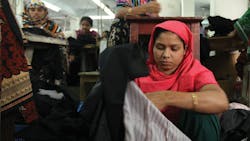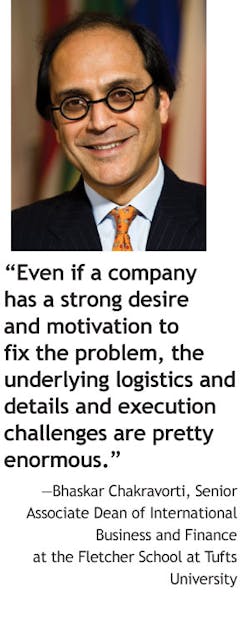It has been slightly more than a year since the collapse of the Rana Plaza factory building near Dhaka, Bangladesh, a tragedy that killed more than 1,000 people, mostly garment workers, and injured several thousand more.
The catastrophic event brought widespread public attention not only to what has been an ongoing issue -- the poor working conditions of many garment workers in that country -- but also, more broadly, to the far-flung extended supply chains that feed products to brand name companies and the challenges that lie therein. Particularly challenges that relate to the health and safety of the millions of workers in developing economies engaged in those supply chains.
Because as tragic and huge as it was, the Rana Plaza factory collapse was simply among the latest in a long line of safety and labor incidents -- some very public, like the apparent suicides at a Foxconn facility in China several years earlier, and some not.
Within a month of the Rana Plaza collapse, retailers, buyers and several international unions had pledged to improve the safety of ready-made garment factories within Bangladesh. The pledge, more formally known as the Accord on Fire and Building Safety in Bangladesh, has been signed by more than 100 global brands and retailers to date. Among the brands that have signed the Accord are Adidas, Fruit of the Loom, Abercrombie & Fitch, and PVH Corp., the company behind Calvin Klein and Tommy Hilfiger.
The pledge has been more than words. Safety inspections, an important component of the accord, are underway. As of late April, inspections at approximately 250 factories covered by the Accord had been completed, with the aim of identifying fire, electrical and building structural safety risks. Inspectors had identified critical findings in eight buildings, which led to recommendations that the buildings be temporarily evacuated until improvements could be made. Signatory brands to the Accord must provide financial assistance to factory owners if needed to remediate the factories.
Nevertheless, the Accord's first year has not been without its issues. In response to Dutch media reports in January, Accord Executive Director for International Operations Alan Roberts acknowledged that unauthorized subcontracting is a challenge and said "it is impossible for the Accord alone to end the practice of unauthorized subcontracting."
Roberts' comment neatly captures why unsafe working conditions persist in the extended supply chains of multinational corporations. Solutions never are simple when social responsibility and cost pressures collide.
Let's Look at Incentives
Bhaskar Chakravorti says health and safety standards and human rights have not kept pace with the rapid expansion of supply chains into low-cost locations. Moreover, Chakravorti, senior associate dean of international business and finance at the Fletcher School at Tufts University, suggests incentives get in the way of improving these and other elements of corporate social responsibility.Factory Inspections on the Rise
Beyond their participation in the Bangladesh Accord, there's evidence that companies are engaged in efforts to improve safety not only in the Bangladesh garment factories, but also elsewhere and in other industries. Two firms say they are seeing increasing requests for information or audits related to safety and labor standards.
At Asiainspection, the number of ethical audits (health and safety and child labor, as examples) and manufacturing audits conducted in Asia are up 156% in the first quarter of 2014 compared with the same time last year. In comparison, business as a whole for the quality control service provider has grown by 22% in the same time frame, says its CEO, Sebastien Breteau. Asiainspection partners with brand name companies, retailers and importers to provide auditing services, product inspection and testing services. The company has begun expanding into Africa and Latin America from its roots in Asia.
Breteau admits the auditing process is not an exact science. A factory being audited may be free of child labor, but that's because the children are located in satellite workshops around the factory. "Then we go there," he says.
His company typically audits factories once a year, unless a problem is discovered. In those instances, they return in three months to determine whether recommended fixes have been implemented.
"We ask questions. We repeat questions. The simple fact that we come and we ask all those criteria about child labor, about hygiene, about safety, about wages, we help the brand or the retailer to convey a message," Breteau says. "It is a continuous improvement process. We cannot fix everything overnight."
Breteau highlights additional signs of an increased focus on ethical audits. Major brands once audited their top 50 factories, which sounds like (and is) a lot, but a global brand could be sourcing product from 300 to 500 or more factories worldwide. Today some of those same companies are auditing as much as 100% of their factories, the Asiainspection CEO says.
The Risk of Change
Breteau notes, however, that retailers or other companies can be their own worst enemies when it comes to introducing risk into their supply chains. For example, he estimates companies change about a quarter of their factories every year in the search for better pricing.
"When you outsource your manufacturing, you are mainly looking at cost. It's a matter of survival; it's a matter of you being competitive in the market. You always have to look for a cheaper factory. This is the DNA of sourcing," he says.
However, firms "are taking additional risk because they are going to a factory they have never worked with before." Moreover, such companies are not necessarily auditing the new factories prior to the switch, he adds.
As an addendum, he notes that sometimes companies don't know what factories provide their product or the conditions in which the workers operate. It happens because the brands are working with vendors that act as middlemen.
The CEO says he advises clients to stay abreast of which factories are producing their goods and insist middlemen share information when new factories join the portfolio. "This is not done enough. It is changing," he says.
Unlike Asiainspection, TRACE International's expertise lies in the arena of anti-bribery compliance, providing due diligence services for multinationals and their third-party intermediaries. Nevertheless, over time TRACE International has expanded the due diligence questions it asks third parties, in response to customer requests.
Those additions range from questions about forced, trafficked or child labor to conflict minerals. In fact, questions related to human trafficking increased suddenly about a year and a half ago in response to the California Transparency in Supply Chains Act, says TRACE International President Alexandra Wrage. The California law requires certain companies doing business in the state to disclose on their websites what efforts they are making, if any, to address slavery and human trafficking risks in their supply chain.
Unlike Asiainspection, TRACE International does not perform audits to verify responses to its questions on human trafficking or child labor. "It is a self-certification," she says. That's in contrast to the organization's primary focus, anti-bribery, where it does perform further investigation if warranted.
Nevertheless, Wrage says there is value in self-certification. "There are cynics, who I respect, who will say self-certification on this doesn't really have any meaning. You have to go in and audit," she says.
"My response to that is ... if you've got the budget, time and capacity to audit, [then] you should be doing that. It requires a high level of expertise, it can be dangerous, and we've certainly heard stories of people coming in through the front door as they're scurrying people out the back," she says. "But questions about labor standards, they're still worth asking because I think they are norm-changing. If companies are asked, they are on notice that this is of importance to large multinationals."
"We aren't going to eradicate these practices, but we are putting people on notice about what is and isn't acceptable," she adds.
Generation Y, also known as millennials, is also putting companies on notice. In this instance, it's the multinationals that are on notice.
Gen Y in Power
"Generation Y is coming into power as a consumer," Breteau says. "It is important to them that the products they buy are made in acceptable conditions, that the lives of the workers aren't put in danger. From a consumer, the brand is where the responsibility lies."
And activists remain vigilant. In March, for example, nonprofit Green America launched a campaign targeting Apple, urging consumers to stop Apple purchases due to allegations that supplier factories in China are putting workers at risk of toxic chemical exposure. The organization noted that Apple produces high-margin products and could, therefore, afford to make a switch to less toxic but more expensive alternatives.
"We all need to collaborate to fix this huge challenge," says Chakravorti. "I think there are many companies that are sincere in their [social responsibility] responses. The actual implementation of their initiatives still leaves a lot to be desired."
About the Author
Jill Jusko
Bio: Jill Jusko is executive editor for IndustryWeek. She has been writing about manufacturing operations leadership for more than 20 years. Her coverage spotlights companies that are in pursuit of world-class results in quality, productivity, cost and other benchmarks by implementing the latest continuous improvement and lean/Six-Sigma strategies. Jill also coordinates IndustryWeek’s Best Plants Awards Program, which annually salutes the leading manufacturing facilities in North America.
Have a story idea? Send it to [email protected].


